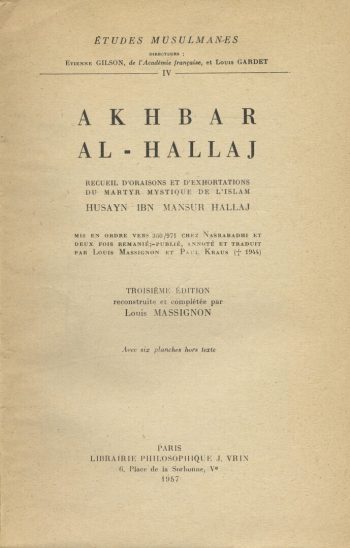Etudes Musulmanes IV. Akhbar Al-Hallaj. Recueil d’Oraisons et d’Exhortations du Martyr Mystique de l’Islam Husayn Ibn Mansur Hallaj.
Massignon, Louis & Paul Kraus/ Al-Hallaj.
Synopsis
Mansur al-Hallaj (c. 858- 922H) was a Persian mystic, revolutionary writer and pious teacher of Sufism most famous for his apparent, but disputed, self-proclaimed divinity, his poetry and for his execution for heresy at the orders of the Abbasid Caliph Al-Muqtadir after a long, drawn-out investigation.
Al-Hallaj was born around 858 in Fars province of Persia to a cotton-carder (Hallaj means “cotton-carder” in Arabic). His grandfather was a Zoroastrian. His father lived a simple life, and this form of lifestyle greatly interested the young al-Hallaj. As a youngster he memorized the Qur’an and would often retreat from worldly pursuits to join other mystics in study. Al-Hallaj later married and made a pilgrimage to Mecca, where he stayed for one year, facing the mosque, in fasting and total silence. After his stay at the city, he travelled extensively and wrote and taught along the way. He travelled as far as India and Central Asia gaining many followers, many of whom accompanied him on his second and third trips to Mecca. After this period of travel, he settled down in the Abbasid capital of Baghdad.
Among other Sufis, al-Hallaj was an anomaly. Many Sufi masters felt that it was inappropriate to share mysticism with the masses, yet al-Hallaj openly did so in his writings and through his teachings. He began to make enemies. This was exacerbated by occasions when he would fall into trances which he attributed to being in the presence of God. During one of these trances, he would utter Arabic: أنا الحق Anā l-Ḥaqq “I am The Truth,” which was taken to mean that he was claiming to be God, since al-Ḥaqq “the Truth” is one of the Ninety Nine Names of Allah. In another controversial statement, al-Hallaj claimed “There is nothing wrapped in my turban but God,” and similarly he would point to his cloak and say, ما في جبتي إلا الله Mā fī jubbatī illā l-Lāh “There is nothing in my cloak but God.” These utterances led to a long trial, and his subsequent imprisonment for 11 years in a Baghdad prison. He was publicly crucified on March 26, 922. (Wikipedia)






